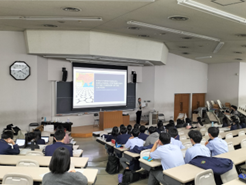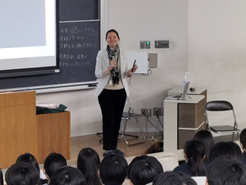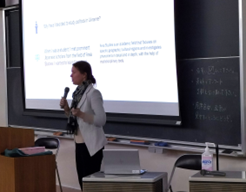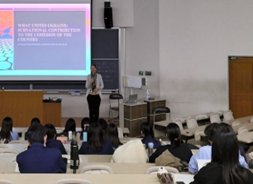
As a part of Career Month November welcoming professionals from various academic backgrounds, students had an opportunity to meet Ms. Valentyna Romanova, researcher at the JETRO Institute of Developing Economies. Ms Romanova spoke about her experience researching subnational and state-wide politics in Ukraine and her recent findings before and after the Russia Ukraine conflict.

Ms Romanova began with a question: “Why is it surprising that Ukraine did not surrender to Russia in 2022?” She answered this query highlighting two factors; oversimplification of Ukraine through “The Myth of Two Ukraines”, and the presence of loyalty from the citizens to the government before the Russian aggression.
“The Myth of Two Ukraines”, based on early research conducted by Mykola Ryabchuk in 1990s, generalised the theory that West Ukraine and East Ukraine are dramatically different from one another due to the existence of polar political and social beliefs within the two areas. While the socio-political rift between the two sides was evident, other studies, including further research of Mykola Ryabchuk, put this theory under question. Ms Romanova critiqued the theory to be “over simplistic” and “outdated”. She justified this argument by examining not only parliamentary and presidential elections, but also regional (“prefectural”) and municipal elections and showing the lack of a strong bipolar divide between East and West. The results of the 2019 presidential elections and the 2019 parliamentary elections contradicted the divide of the nation.

The unification of Ukraine was achieved through the Ukrainians’ loyalty towards the government. Ms Romanova brought attention to the linear increase of the people’s trust towards the Ukrainian government caused not only by the 2014 and 2022 ongoing conflict, but by the political measures, like the decentralization reform.
The decentralisation reform, conducted by the Ukrainian government, promoted local amalgamation of small communities to larger communities. The implementation of this policy, Ms Romanova explained, allowed local authorities to hold more credibility and power. The people were able to gain trust in the local governing bodies, leading to trust towards both the local and central authorities. After the reform, data showed an increase in votes for local mayors and a decrease in support for the Zelensky party, leading many to think Zelensky was unable to gain trust from the people. However, Ms Romanova disagreed, pointing out that local mayors were supported for the improvement in public services, and the impression of the central government was increasing alongside this.
In conclusion, the unification of Ukraine was achieved, firstly as Ukraine was not divided into polar opposites, and the decentralisation reform increased trust of the people to the local and central government.
Through her success in the realm of research, Ms Romanova stressed the importance of data, and that there is no end to the justification of proof that one can excavate. Her message to the students participating was the following: Academic society is desiring specialists not generalists in research. It is important for you to think about how you can contribute to society in seven- or eight-years’ time, and I am sure you will be able to find a passion original to yourself.

